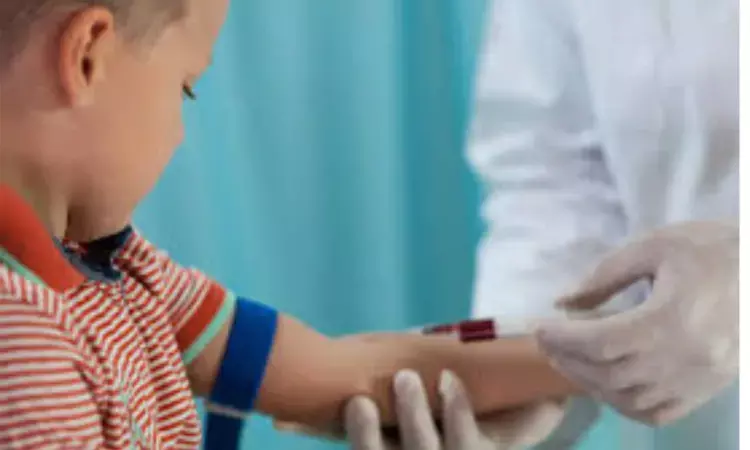- Home
- Medical news & Guidelines
- Anesthesiology
- Cardiology and CTVS
- Critical Care
- Dentistry
- Dermatology
- Diabetes and Endocrinology
- ENT
- Gastroenterology
- Medicine
- Nephrology
- Neurology
- Obstretics-Gynaecology
- Oncology
- Ophthalmology
- Orthopaedics
- Pediatrics-Neonatology
- Psychiatry
- Pulmonology
- Radiology
- Surgery
- Urology
- Laboratory Medicine
- Diet
- Nursing
- Paramedical
- Physiotherapy
- Health news
- Fact Check
- Bone Health Fact Check
- Brain Health Fact Check
- Cancer Related Fact Check
- Child Care Fact Check
- Dental and oral health fact check
- Diabetes and metabolic health fact check
- Diet and Nutrition Fact Check
- Eye and ENT Care Fact Check
- Fitness fact check
- Gut health fact check
- Heart health fact check
- Kidney health fact check
- Medical education fact check
- Men's health fact check
- Respiratory fact check
- Skin and hair care fact check
- Vaccine and Immunization fact check
- Women's health fact check
- AYUSH
- State News
- Andaman and Nicobar Islands
- Andhra Pradesh
- Arunachal Pradesh
- Assam
- Bihar
- Chandigarh
- Chattisgarh
- Dadra and Nagar Haveli
- Daman and Diu
- Delhi
- Goa
- Gujarat
- Haryana
- Himachal Pradesh
- Jammu & Kashmir
- Jharkhand
- Karnataka
- Kerala
- Ladakh
- Lakshadweep
- Madhya Pradesh
- Maharashtra
- Manipur
- Meghalaya
- Mizoram
- Nagaland
- Odisha
- Puducherry
- Punjab
- Rajasthan
- Sikkim
- Tamil Nadu
- Telangana
- Tripura
- Uttar Pradesh
- Uttrakhand
- West Bengal
- Medical Education
- Industry
Early detection and treatment of familial hypercholesterolemia in children cost effective and cost saving

Netherlands: Early detection and treatment program for familial hypercholesterolemia (FH) in children provides excellent value for investment, being both health and cost-saving from a healthcare stance, a recent study has suggested. The study was published in JAMA Pediatrics on May 1, 2023.
The authors state that the interpretations and findings are conditional on assumptions basic in the health economic model.
Familial hypercholesterolemia occurs due to a genetic abnormality affecting the function, structure, or metabolism of the low-density lipoprotein (LDL) receptor, resulting in increased plasma LDL-C (LDL cholesterol). Several gene variants can underlie FH, including those involving the LDL receptor, apolipoprotein B, or PLSK9 (proprotein subtilisin/kexin type 9), which leads to a marked increase of plasma LDL-C from birth and, without intervention, throughout life.
The Netherlands has a long-term history of active screening for familial hypercholesterolemia, enabling health-economic analyses. Zanfina Ademi, Monash University, Melbourne, Victoria, Australia, and colleagues, therefore, investigated the cost-effectiveness and the ROI (return on investment) of a nationwide cascade case-finding and preventive treatment program starting with FH identification in children and treatment from both a health care and societal perspective.
For this purpose, early preventive treatment and cascade case-finding was modelled to stimulate the disease progression and costs of 10-year-olds doubted of having heterozygous familial hypercholesterolemia over a lifetime. The model comprised three health states: alive with coronary heart disease (CHD), alive without CHD, and deceased. The risk of a first CHD event was quantified as a function of age and total lifetime exposure to LDL cholesterol. Cost-effectiveness was defined as $21 800 per gain in QALYs (quality-adjusted life-years), using incremental cost-effectiveness ratios (ICERs). All future costs and benefits were discounted annually by 4% and 1.5%, respectively.
A comparison was drawn between two strategies; (1) cascade screening and treatment initiation with statin children (mean age ten years) and (2) no screening, later detection, and treatment.
The authors reported the following findings:
- In this model constructed to simulate the FH progression bin 1000 hypothetical 10-year-olds, from a healthcare perspective, the program would gain 2.53 QALYs per person at an additional cost of €23 365 ($25 468) (both discounted). These amount to an ICER of €9220 ($10 050) per gain in QALY.
- From the societal perspective, the treatment and detection treatment program were cost-saving over a lifetime versus no cascade screening for familial hypercholesterolemia.
- The ROI for the detection and treatment program for familial hypercholesterolemia in children was €8.37 ($9.12).
To conclude, early detection and treatment program for FH in children offers excellent value for investment, being both health and cost-saving and cost-effective from a healthcare perspective.
Reference:
Ademi Z, Norman R, Pang J, et al. Cost-effectiveness and Return on Investment of a Nationwide Case-Finding Program for Familial Hypercholesterolemia in Children in the Netherlands. JAMA Pediatr. Published online May 01, 2023. doi:10.1001/jamapediatrics.2023.0763
Dr Kamal Kant Kohli-MBBS, DTCD- a chest specialist with more than 30 years of practice and a flair for writing clinical articles, Dr Kamal Kant Kohli joined Medical Dialogues as a Chief Editor of Medical News. Besides writing articles, as an editor, he proofreads and verifies all the medical content published on Medical Dialogues including those coming from journals, studies,medical conferences,guidelines etc. Email: drkohli@medicaldialogues.in. Contact no. 011-43720751


